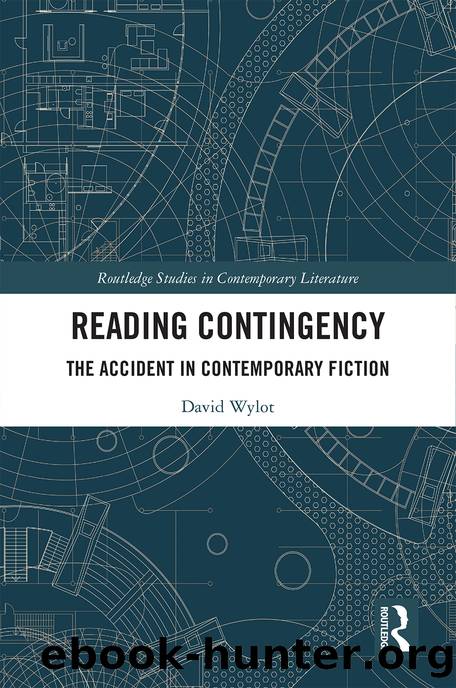Reading Contingency by Wylot David;

Author:Wylot, David;
Language: eng
Format: epub
Publisher: Taylor & Francis Group
Published: 2020-05-15T00:00:00+00:00
Reading Contingency
To outline the relationship between reading contingency and living contingency, we need to unpick the wholesale distinction between narrative contingency and actual contingency. Philosopher Slavoj Žižek considers the problem of this distinction in detail. He argues that contingency structurally anticipates its conversion into necessity in hindsight. This anticipatory assimilation poses a central problem for the philosophy of modality, which resides in contingencyâs uncertain status:
is it ontological, i.e., are things in themselves contingent, or is it epistemological, i.e., is contingency merely an expression of the fact that we do not know the complete chain of causes which brought about the allegedly âcontingentâ phenomenon?
(1993, 153)
Turning to a consideration of contingencyâs ontological or epistemological status, a persistent question for the philosophy of chance, Žižek argues that an ontologically contingent event, here, would resist satisfactory causal explanation in the final instance. It would not, Žižek argues, be possible to predict in advance, no matter our knowledge of prior conditions, but would rather âsomehow happen out of nowhereâ (2014, 4). To describe contingency as epistemological, however, suggests the impression of contingency is rather a misperception of something of which we lack full knowledge. There is a chance that contingency is not really contingent, and that the future, as mechanical determinists would suggest, was actually always going to happen in this way, but we just didnât know it at the time.11
Crucially for Žižek, it is nigh impossible to determine whether contingency is ontological or merely epistemological. This creates, he suggests, âthe ontological scandal of the ultimate undecidability between the two choicesâ (1993, 155). Such undecidability arises because of temporal perspective. When a chance event irrupts, it urges a cognitively delayed form of retrospection that situates the contingent arrival within the context of its possible, and therefore for Žižek possibly necessary, causes and conditions once passed. This undecidability, then, rests on the impossibility of knowing whether the perceived determinants for a chance event merely accrue the modality of necessity after the fact, or are themselves actually necessary. Žižek thus obsesses over the idea that contingencyâs intelligibility depends on a form of hindsight that itself threatens to shatter the eventâs appearance of contingency. He terms this procedure the âretroactive glanceâ, an act of hindsight that both looks back on something and in doing so transforms the past. There lies, he suggests, an uncertainty as to whether the retroactive glance invents and imposes precarious causal explanation after the fact onto contingency, or whether, in fact, it reveals a deterministic causality already implicit in the event, meaning that it would have been possible, with the right knowledge, to foresee the contingent event prior to its emergence.
Although Žižek insists that we cannot allow this retrospective logic to lull us into thinking that the world is predetermined, contingency is nonetheless locked into a perpetual struggle with necessity, because contingency structurally anticipates its retrospective configuration.12 Therein:
resides the dialectical reversal of contingency into necessity, i.e., the way the outcome of a contingent process is the appearance of necessity: things retroactively âwill have beenâ necessary.
Download
This site does not store any files on its server. We only index and link to content provided by other sites. Please contact the content providers to delete copyright contents if any and email us, we'll remove relevant links or contents immediately.
The Power of Myth by Joseph Campbell & Bill Moyers(1068)
Half Moon Bay by Jonathan Kellerman & Jesse Kellerman(987)
A Social History of the Media by Peter Burke & Peter Burke(987)
Inseparable by Emma Donoghue(983)
The Nets of Modernism: Henry James, Virginia Woolf, James Joyce, and Sigmund Freud by Maud Ellmann(913)
The Spike by Mark Humphries;(812)
The Complete Correspondence 1928-1940 by Theodor W. Adorno & Walter Benjamin(789)
A Theory of Narrative Drawing by Simon Grennan(782)
Culture by Terry Eagleton(776)
Ideology by Eagleton Terry;(743)
World Philology by(719)
Farnsworth's Classical English Rhetoric by Ward Farnsworth(715)
Game of Thrones and Philosophy by William Irwin(712)
Bodies from the Library 3 by Tony Medawar(709)
High Albania by M. Edith Durham(705)
Adam Smith by Jonathan Conlin(695)
A Reader’s Companion to J. D. Salinger’s The Catcher in the Rye by Peter Beidler(688)
Monkey King by Wu Cheng'en(654)
Comic Genius: Portraits of Funny People by(652)
